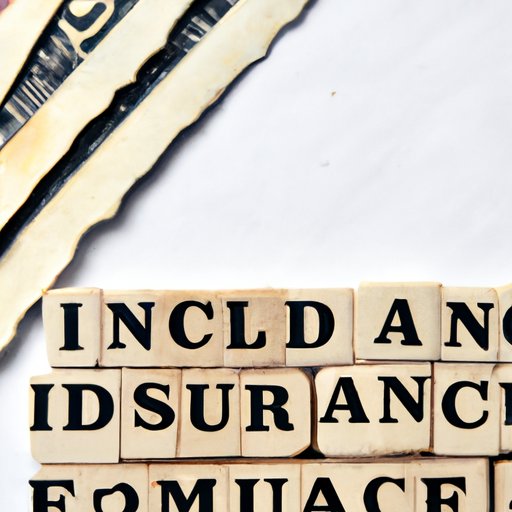
Introduction
Money market accounts are a popular savings option for many Americans, offering a balance of high interest rates and easy access to funds. However, with any financial account comes the risk of loss or theft, which is why FDIC insurance is something every money market account holder should be aware of. In this article, we will explore what FDIC insurance is, how it works, and how it protects your money market account.
Understanding FDIC Insurance on Money Market Accounts – What You Need to Know
The Federal Deposit Insurance Corporation, or FDIC for short, is a government organization that provides insurance to protect consumers in case their bank account fails due to bank insolvency or bankruptcy. FDIC insurance is automatically provided to account holders in participating banks and covers up to $250,000 per account holder, per bank, for each ownership category.
In order for your money market account to qualify for FDIC insurance coverage, it must meet certain basic requirements. First, it must be a deposit account held by a participating FDIC-insured bank. Second, it must be a type of account that is eligible for FDIC insurance, which includes savings accounts, checking accounts, money market deposit accounts (MMDAs), and certificates of deposit (CDs).
It’s important to note that not all types of bank accounts are FDIC insured. For example, investment accounts, such as mutual fund or brokerage accounts, are not covered by FDIC insurance.
Keeping Your Savings Safe: How FDIC Insurance Protects Your Money Market Account
FDIC insurance covers your money market account in the event that your bank fails or becomes insolvent. In such cases, the FDIC will step in and take temporary control of the bank, and depositors will receive their insured funds up to the coverage limit.
If you have a joint account with another person, each account holder’s share of the account is insured separately, up to the $250,000 limit, as long as each person’s interest in the account is equal.
FDIC insurance also protects against bank fraud, theft, and embezzlement. In the event that an unauthorized individual gains access to your account and steals funds, you may be able to recover those funds through FDIC insurance.
It’s important to note that FDIC insurance only covers the amount of your deposit up to the $250,000 limit. Any funds you have above that amount won’t be insured and may be lost in the event of bank failure or insolvency.
Money Market Accounts and FDIC Insurance: The Basics Explained
Money market accounts are similar to savings accounts in that they offer a high interest rate on your deposits while still allowing you easy access to your funds. The key difference is that money market accounts typically require a higher minimum deposit and offer a limited number of checks or transactions per month.
In terms of FDIC insurance coverage, money market accounts are treated the same as other eligible deposit accounts. However, it’s important to note that money market funds, which are mutual funds that invest in short-term, low-risk securities, are not FDIC insured. Investing in a money market fund is similar to investing in any other type of mutual fund, and therefore carries a different set of risks and protections.
The advantages of a money market account include the high interest rates and easy access to funds, making it a good option for those who want a relatively safe investment option while still being able to withdraw their money when needed. Money market accounts typically offer a higher interest rate than a traditional savings account, and the ease of access makes it a good option for regular savers or emergency funds.
FDIC Insurance and Your Money in the Market – Are You Protected?
One common misconception is that FDIC insurance also covers investments in the stock market or other financial products. However, FDIC insurance only covers eligible deposit accounts and does not extend to other types of investments.
For those who invest in the stock market or other financial products, there are other types of investment protection available, such as the Securities Investor Protection Corporation (SIPC) or private insurance. It’s important to understand the protections and risks associated with each investment option before placing your money in the market.
Why You Should Care About FDIC Insurance as a Money Market Account Holder
As a money market account holder, understanding FDIC insurance is crucial to protecting your hard-earned savings. Knowing whether your account is FDIC insured or not can mean the difference between losing your funds in the event of a bank failure or being covered up to the maximum limit.
In addition, knowing the extent of FDIC coverage and the scenarios in which it applies can help you make informed decisions about your finances and investments. Money market accounts offer a balance of high interest rates and access to funds, and with the added security of FDIC insurance, they can be a smart savings option for many Americans.
Conclusion
FDIC insurance is an important aspect of protecting your money market account, providing coverage up to the maximum limit in case of bank failure or insolvency. It’s important to know whether your account is FDIC insured and to understand the extent of coverage provided. By taking the time to educate yourself on FDIC insurance and understanding how it works for money market accounts, you can make informed decisions about your finances and investments, and have peace of mind knowing your hard-earned savings are protected.
Take a moment to check whether your money market account is FDIC insured and, if not, consider opening an account at an FDIC-insured bank. Knowing you have FDIC protection for your savings can give you the confidence to pursue your financial goals and plan for a secure future.




